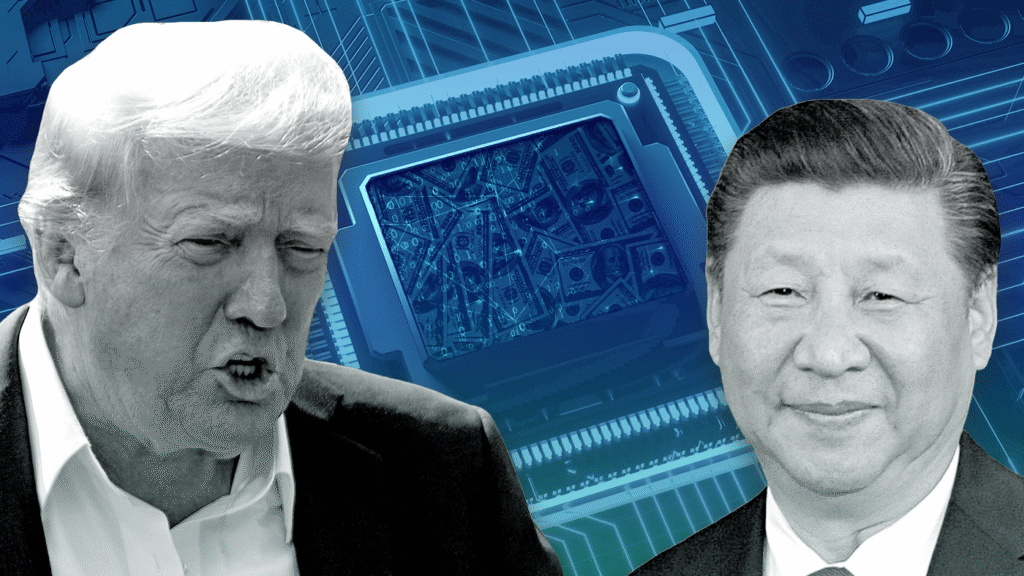The recent Trump approved AI chip deal allowing Nvidia to resume sales of its H20 processor to China was expected to ease tensions and open markets. Instead, Beijing gave a surprisingly cold response raising security concerns and encouraging local firms to avoid it. The muted reaction reveals deeper geopolitical motives.
After years of strict export controls, President Donald Trump made a surprise policy U turn last month. Nvidia, previously blocked from selling its H20 chip to China, received approval under a revenue-sharing agreement 15% of sales would flow directly to the U.S. government.
The H20 chip itself is not Nvidia’s crown jewel. It is a downgraded version of its more powerful H100 and H200 GPUs, designed specifically to comply with earlier restrictions. Still, the change was viewed as significant because it signaled a softening stance after years of tough export bans.
Yet, rather than embracing this concession, Beijing responded with suspicion. Officials labeled the H20 a security risk, summoned Nvidia for explanations, and urged Chinese companies to avoid relying on it.
This unexpected resistance reflects not only mistrust but also confidence in China’s growing semiconductor ecosystem.
Beijing’s muted response: What lies beneath?
Why didn’t China welcome the Trump approved AI chip deal? Three key reasons stand out. Security concerns Beijing suspects the H20 may carry hidden risks, such as remote shutoff features or embedded vulnerabilities.
National pride and strategy China has invested heavily in building its own chip industry, and openly embracing foreign chips could undermine the narrative of self reliance.
Political signaling By rejecting what Washington offered, Beijing demonstrates independence and sends a message that it will not rely on second tier technology.
This response highlights China’s confidence that its domestic players Huawei, Biren Technology, and others are catching up quickly in the AI chip race.
Nvidia’s delicate balancing act
Nvidia’s CEO, Jensen Huang, has been walking a fine line. On one side, he lobbied in Washington to secure export relief. On the other, he traveled to Beijing, reassuring Chinese leaders that Nvidia was committed to long term cooperation.
This balancing act enabled the Trump approved AI chip deal to move forward. However, the lukewarm reception shows how even business diplomacy cannot fully overcome geopolitical suspicion. Nvidia may gain billions in sales, but its position in China remains precarious.
An executive at a Shanghai based AI company recently shared his perspective at a technology forum. He admitted that while Nvidia’s H20 chip was attractive in terms of performance, his firm was hesitant to adopt it.
Even if the chip gives us an edge today, tomorrow it could become a liability if Beijing bans it. Our government wants us to prioritize local suppliers, and we don’t want to be caught in the middle. This reflects the reality even if the technology is useful, politics often decides adoption.
Technology analysts and trade experts have weighed in on the policy shift. Deborah Elms, trade policy advisor, noted. The U.S has turned export control into a revenue tool. That sets a dangerous precedent, shifting from security protection to financial extraction.
Xiang Ligang, Beijing industry commentator, was blunt America won’t sell us what we truly need, but they want to dump obsolete tech on us. We won’t thank them for that.
Former U.S official, speaking anonymously, warned If export rules become pay to play, they lose credibility. National security should not be auctioned. These perspectives underscore how both sides view the deal more as a political tool than a genuine economic solution.
Beyond the chip
The Trump approved AI chip deal is more than just about hardware it’s about power. For the U.S it provides short term financial gains and a way to maintain leverage while showing flexibility.
For China, rejecting the deal signals strength, boosts domestic industry pride, and avoids appearing dependent. For Nvidia, it’s a temporary lifeline but also a reminder that it operates at the mercy of government policies on both sides.
This is a classic case of geopolitics shaping technology markets. The chip may be silicon, but its value is symbolic. When speaking with colleagues in the tech sector across Asia, I’ve noticed a recurring theme, companies are increasingly designing strategies to reduce dependency on U.S technology, even if alternatives are less advanced.
One Chinese AI researcher put it simply, Better to train with slower chips we control than to rely on faster ones that can be taken away anytime. This sentiment reveals why Beijing refused to celebrate the deal control and independence matter more than short term performance gains.
A deal that changed little
The Trump approved AI chip deal may appear like a diplomatic gesture, but it has changed little in practice. U.S policymakers gained revenue and headlines. Nvidia regained partial access to China, but with reputational risks.
China showcased its determination to rely on domestic innovation rather than imported, restricted technology. In the end, Beijing’s cold response tells us that the global tech rivalry is not just about chips it’s about trust, sovereignty, and long term control over the future of AI.

